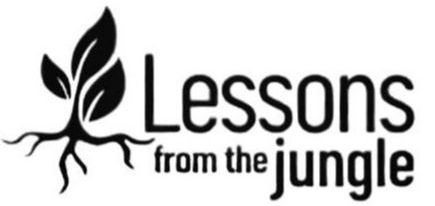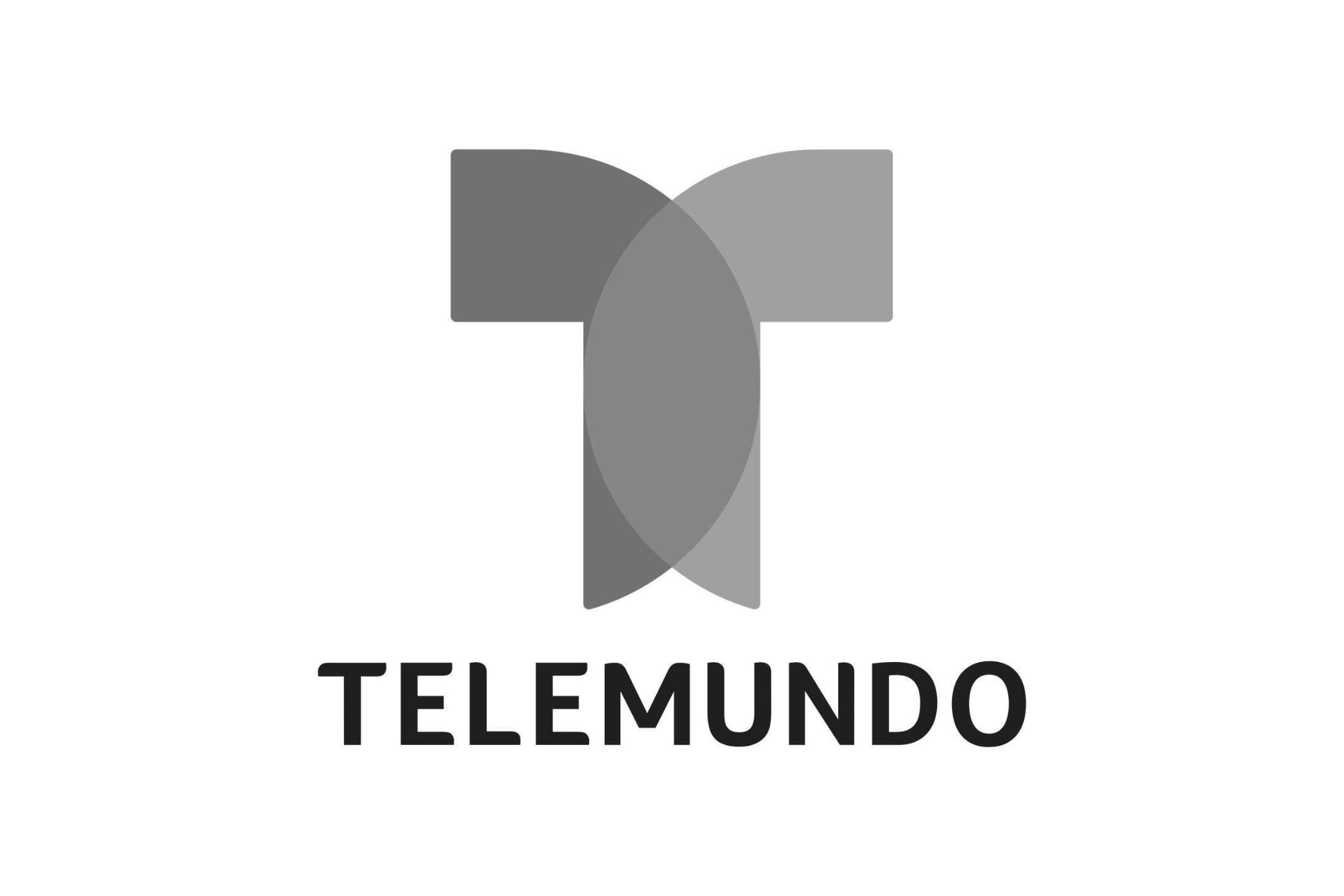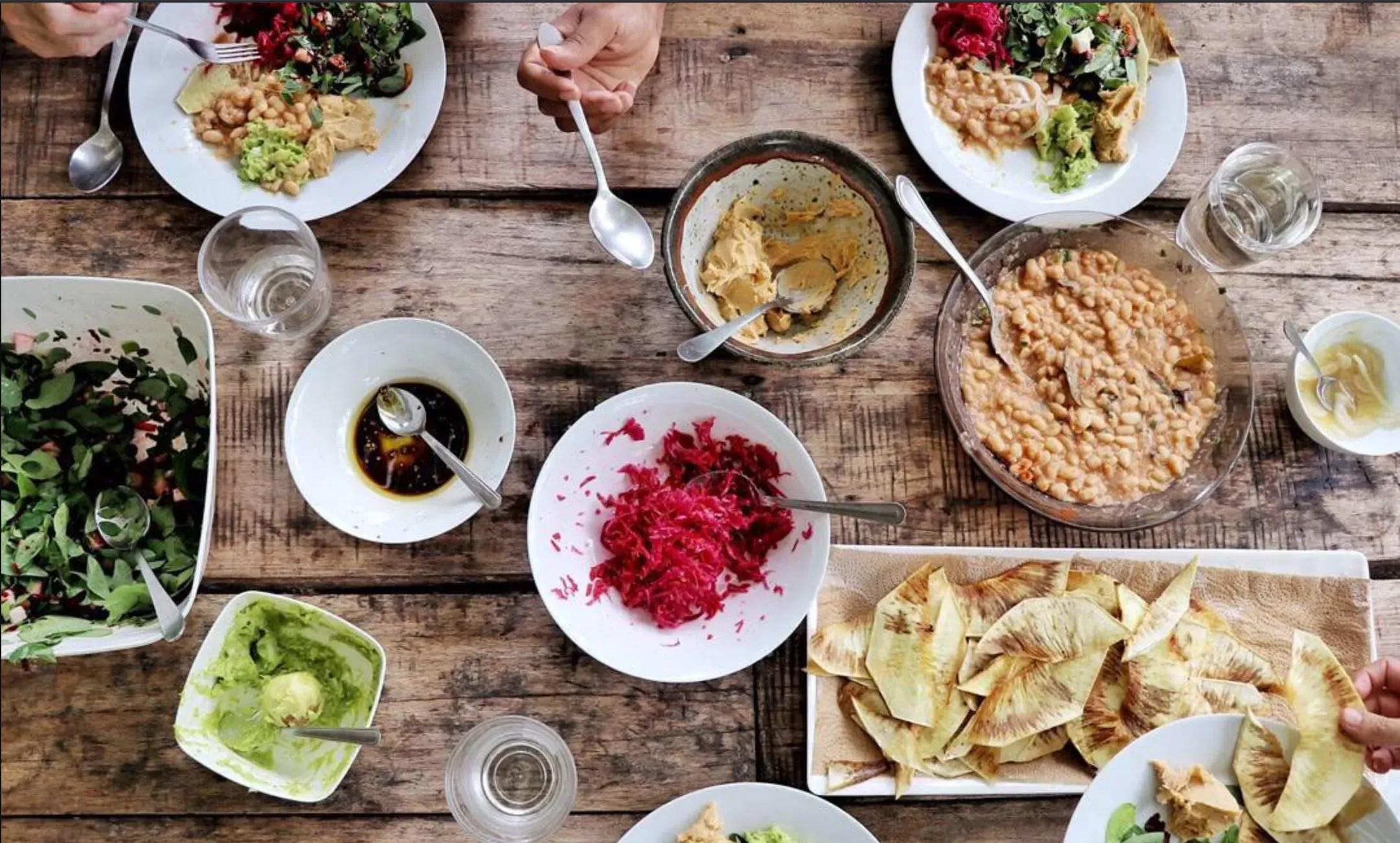What You Can Achieve With Tropical Permaculture
-
Design your living ecosystem - with food forests, roots, grains, beans, and vegetable gardens and create a green home powered by rainwater, energy, and waste recycling systems.
-
Grow your own supermarket at home - raise chickens for eggs, care for honey bees, and master 50+ recipes, from balanced farm-to-table meals to pantry staples like flour, chocolate, vinegar, oil, and ferments.
-
Grow over $10,000 worth of food yearly - or thousands from just 100m².
That’s using local supermarket prices - the real value of homegrown organic is much higher. -
Feed a family of two+ from just 2,000m² (½ acre) or adapt our plan to a smaller garden or community space.
-
Maintain your homestead with just 4 hours of work per week - using regenerative, efficent, low-effort methods.
- Get the proven system that has trained over 1,000 students worldwide - now available online!
Who This Course Is For
-
Anyone interested in growing food in the tropics - from backyard beginners to serious growers.
-
Food forest enthusiasts & gardeners who want food systems that thrive in tropical climates.
-
Homesteaders and landowners - ready to turn their land into productive, low-maintenance abundance.
-
Permaculture designers looking to sharpen their tropical design skills and tools.
-
Community leaders and organizers - bringing food security and resilience to their regions.
-
Sustainability consultants adding tropical, real-world solutions to their practice.
Gain the skills and tools to transform your life from consumer to producer!
What Makes This Course Different
More than a Gardening Course - The Complete Guide to Self-Sufficiency in the Tropics
-
Built to guide you at every stage - from your first garden bed to a thriving long-term homestead
-
Field-tested over 15+ years on real tropical land
-
Designed for the tropics - humid, wet/dry, and savanna zones
-
Filmed on Finca Tierra’s off-grid homestead - real soil, real systems, real results
-
Custom tools + bonus modules - nutrition charts, garden templates, planning tools, animal care, natural pool & solar dehydrator building, and more
-
Teaches to grow and cook a balanced diet - proteins, fats, carbs, greens, and fruits, and 50+ of our favorite recipes
-
Builds real integration - food, water, energy, and waste cycles in harmony
-
Continuously evolving - with updates and new tools over time
-
Join a global tropical community - exchange tips, seeds, resources, and region-specific advice with others
Hear What Our Students Are Saying

All You Need to Live Sustainably in the Tropics
"I took the Permaculture Design Course with Ana and Ian in 2018, and it completely changed my life. I ended up moving to Costa Rica because of it!
Now, their online course is the most comprehensive guide out there. If you know Ana and Ian, you know they’re total nerds about this stuff—in the best way.
They’ve spent 15 years researching how to live sustainably in the tropics: from building your home and growing your food to natural energy systems and even a natural swimming pool. If you dream of living sustainably in the tropics, this course really has it all.”
— Elizabeth Couse

Designing and Building My Off-Grid Home and Food Forest
“I attended the on-site Permaculture Design Course and recently signed up for the Online Course. I'm so glad I did both!
The on-site course was life-changing and the online course has been invaluable as I design and build my off-grid home and food forest. It’s perfect for beginners, but also great for going deeper or revisiting details, as I start from scratch on my land.
The community forum has been incredibly helpful for niche questions. I highly recommend it for both novices and experienced growers!”
— Sky d’Almeida

From Planning the Garden to Cooking What You Harvest
“I absolutely love Finca Tierra’s Online Permaculture Course. It’s detailed and gives you everything you need to start your tropical garden and live a self-sustained life.
What stood out to me were the amazing garden templates and how the course goes from planning to planting each crop—even to cooking delicious meals.
The videos are excellent, showing everything in detail. You can feel Ana & Ian’s incredible knowledge throughout.”
— Lea Imboden

A Practical Model for Growing Food and Strengthening Local Economies in the Tropics
“As an organic farmer and environmental economist, Finca Tierra’s course stands out as a practical, hands-on manual for growing food in the tropics.
But it’s not just about growing food, it’s about designing a resilient, self-sufficient system that supports you and your community.
This course offers a replicable model that can strengthen your economy, local food systems, and resilience, not only in Costa Rica, but across the tropics.”
— Irene Burgues
What's Inside the Course?
Create a Complete, Nutrient-Rich Diet
Using easy-to-grow tropical staples, this module shows you how to design a balanced, sustainable diet rooted in your land.
You’ll learn how to:
-
Define which parts of your diet to grow based on your time, space, and goals
-
Maximize small areas with nutrient-dense vegetables, fruits, herbs, and spices
-
Design a system that supplies essential calories, proteins, fats, and micronutrients
-
Select the right crops for your nutritional needs — and calculate the space required
Whether you want to supplement your meals or achieve full self-sufficiency, this module gives you the tools to feed yourself well — from a patio garden to a full homestead.
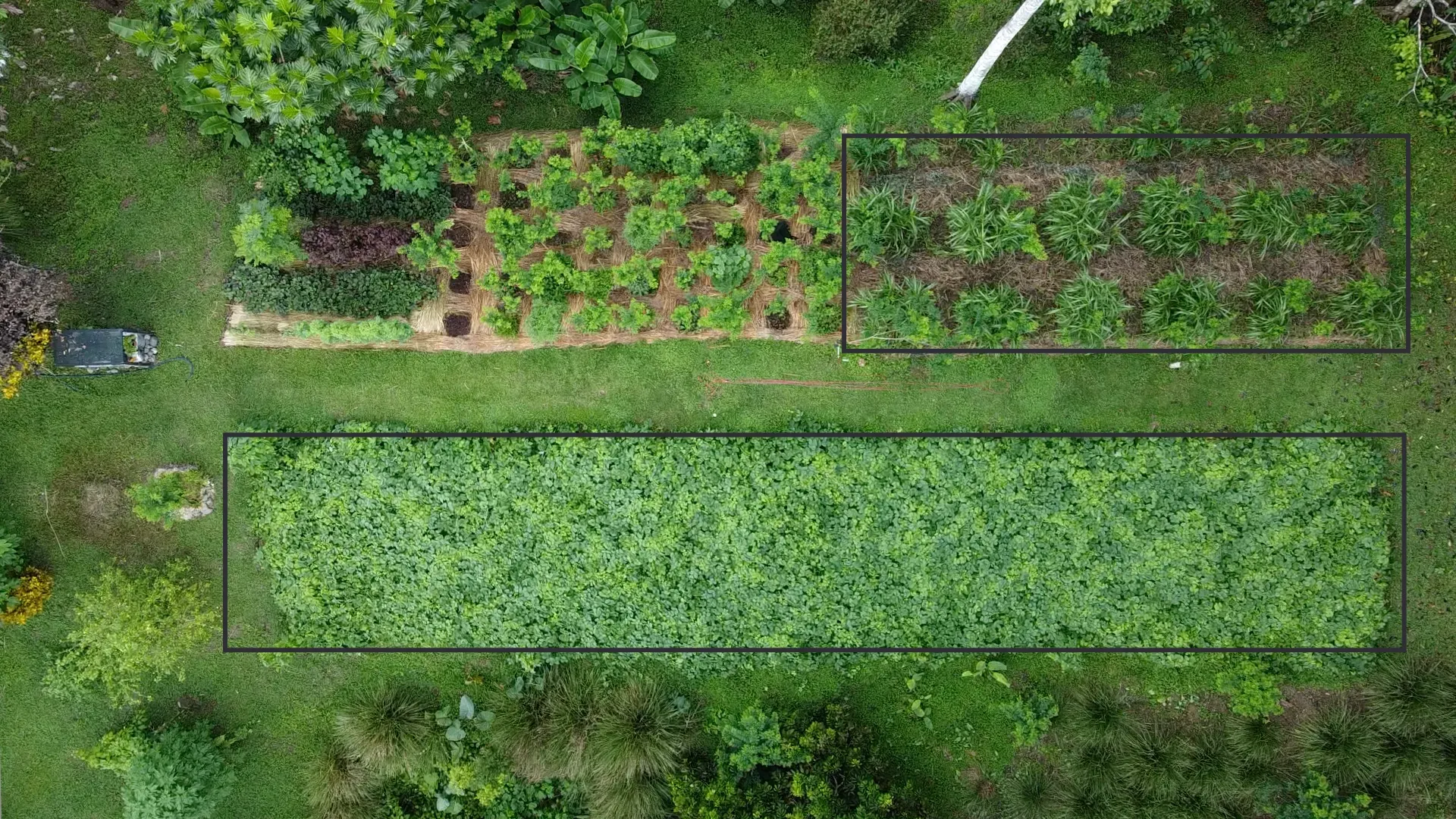
Example Garden with Crop Area & Nutrient Charts
Plan your self-sufficient tropical vegetable gardens, and food forest on 2,000m²—or adapt it to any space. This template shows you how to grow a complete, balanced diet designed to feed two+ people efficiently and sustainably.
You’ll learn how to:
-
Determine how much land you need for a food forest and gardens
-
Use Crop Area and Nutrient Charts to calculate yields and cover nutritional needs
-
Adapt the model to your context — scale down for small plots or expand for families, students, or restaurants
Based on diet and yield data from our homestead, this model makes growing nutrient-dense food simple, efficient, and scalable.
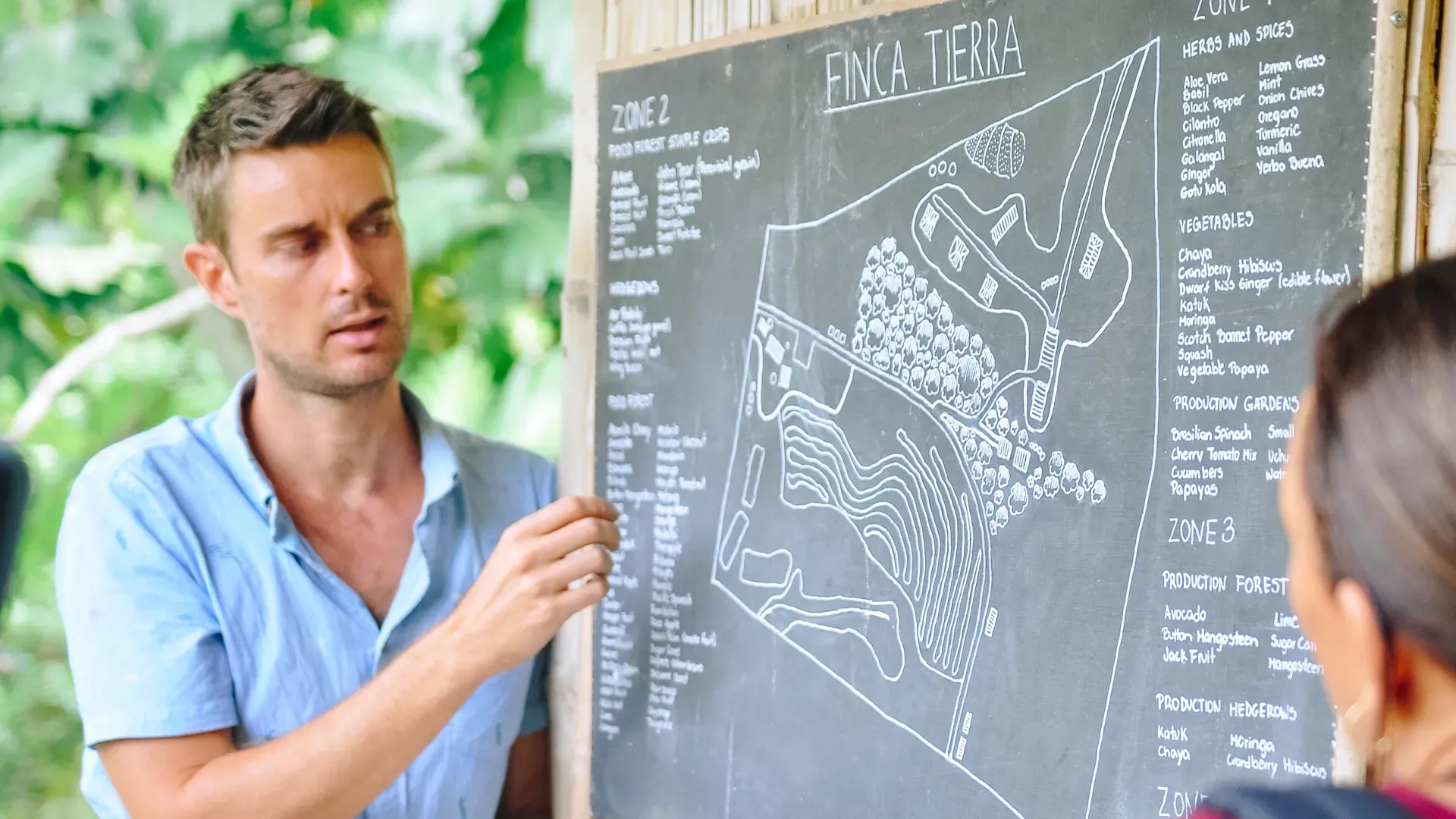
Permaculture Design — Build Your Tropical Homestead
Learn to design a thriving, low-maintenance homestead that integrates food, water, energy, and shelter.
You’ll learn how to:
-
Map and plan your land using permaculture design principles
-
Place gardens, food forests, and water systems for efficiency
-
Design nutrient and energy cycles that reduce waste
-
Create a long-term plan that adapts to your climate and needs
.
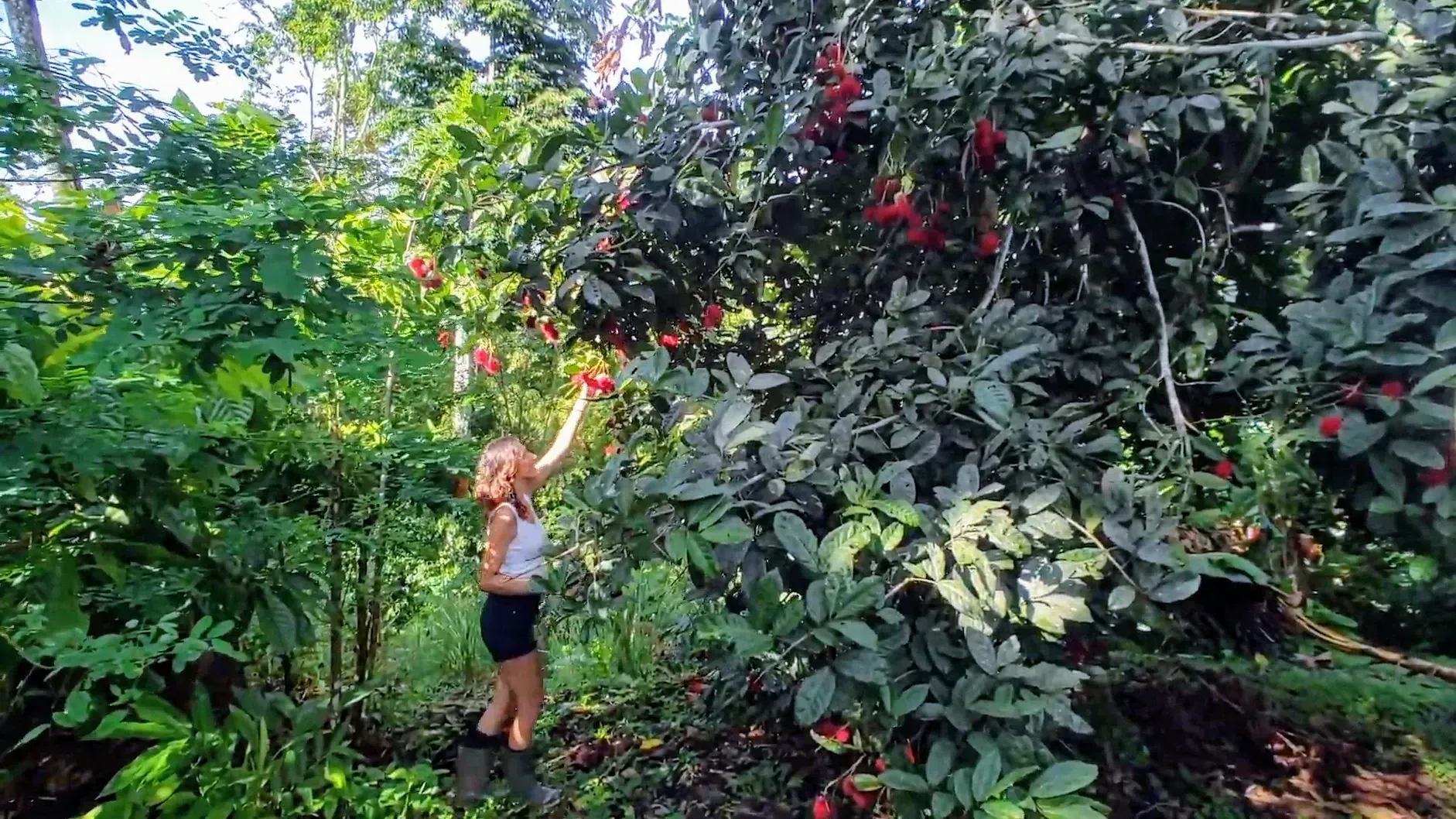
Tropical Food Forest — Abundance with Minimal Effort
Learn how to mimic natural ecosystems to grow fruits, nuts, and perennial crops that regenerate themselves year after year.
You’ll learn how to:
-
Design an easy-to-manage food forest
-
Select the right tropical species for long-term abundance
-
Integrate support species that build soil and provide fertility
-
Reduce labor with good design by letting nature do the work
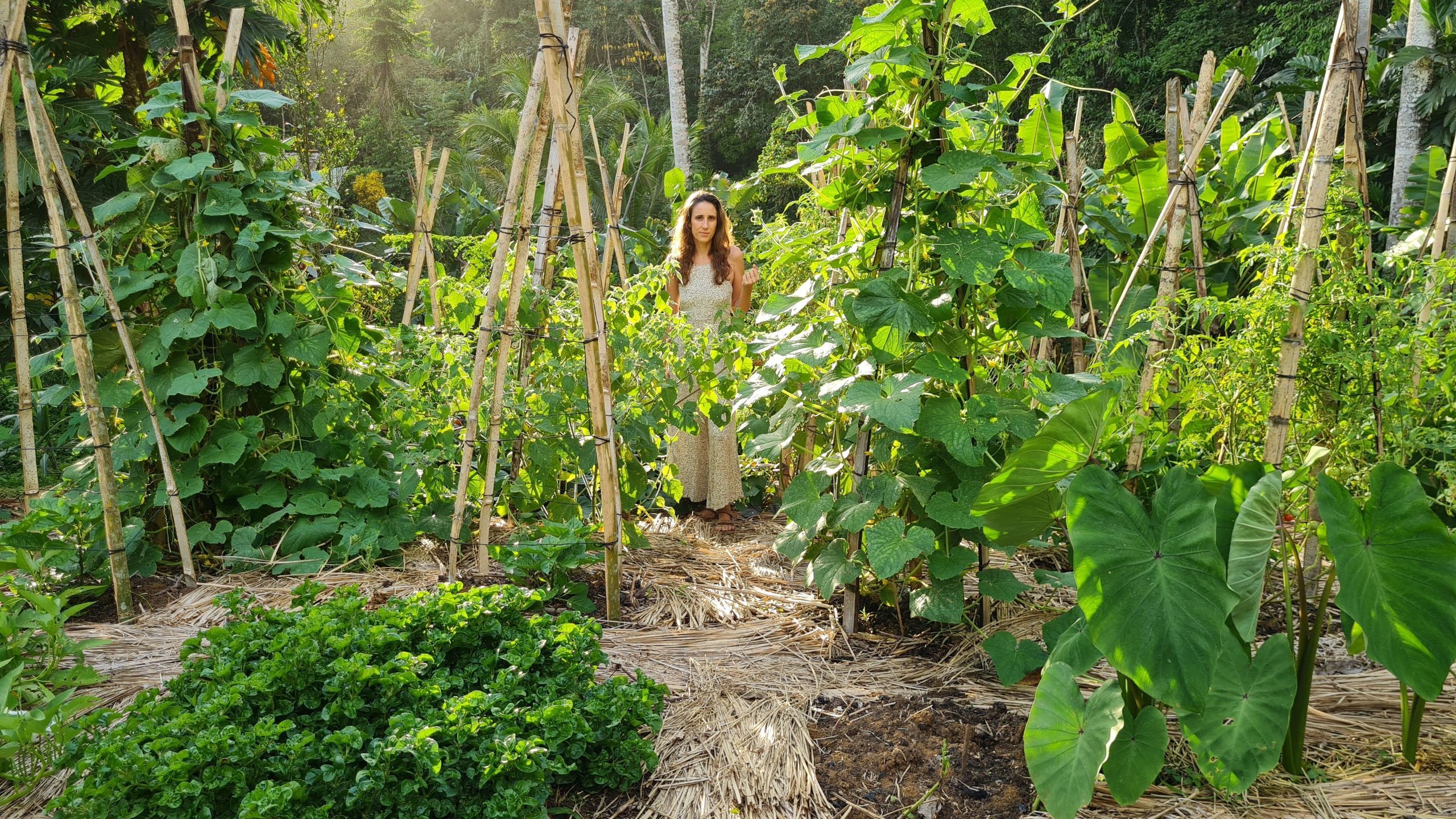
Tropical Vegetable Garden & Staples — Grains, Tubers, Beans & More
Grow the staples that truly feed you in the tropics — from grains, corn, beans, cassava, sweet potatoes, and fresh vegetables to eggs and honey.
You’ll learn how to:
-
Grow calorie-rich staples alongside your vegetables
-
Improve your soil with compost, mulch, and biochar
-
Raise chickens for eggs and bees for honey
-
Plan seasonal harvests so your pantry is always full
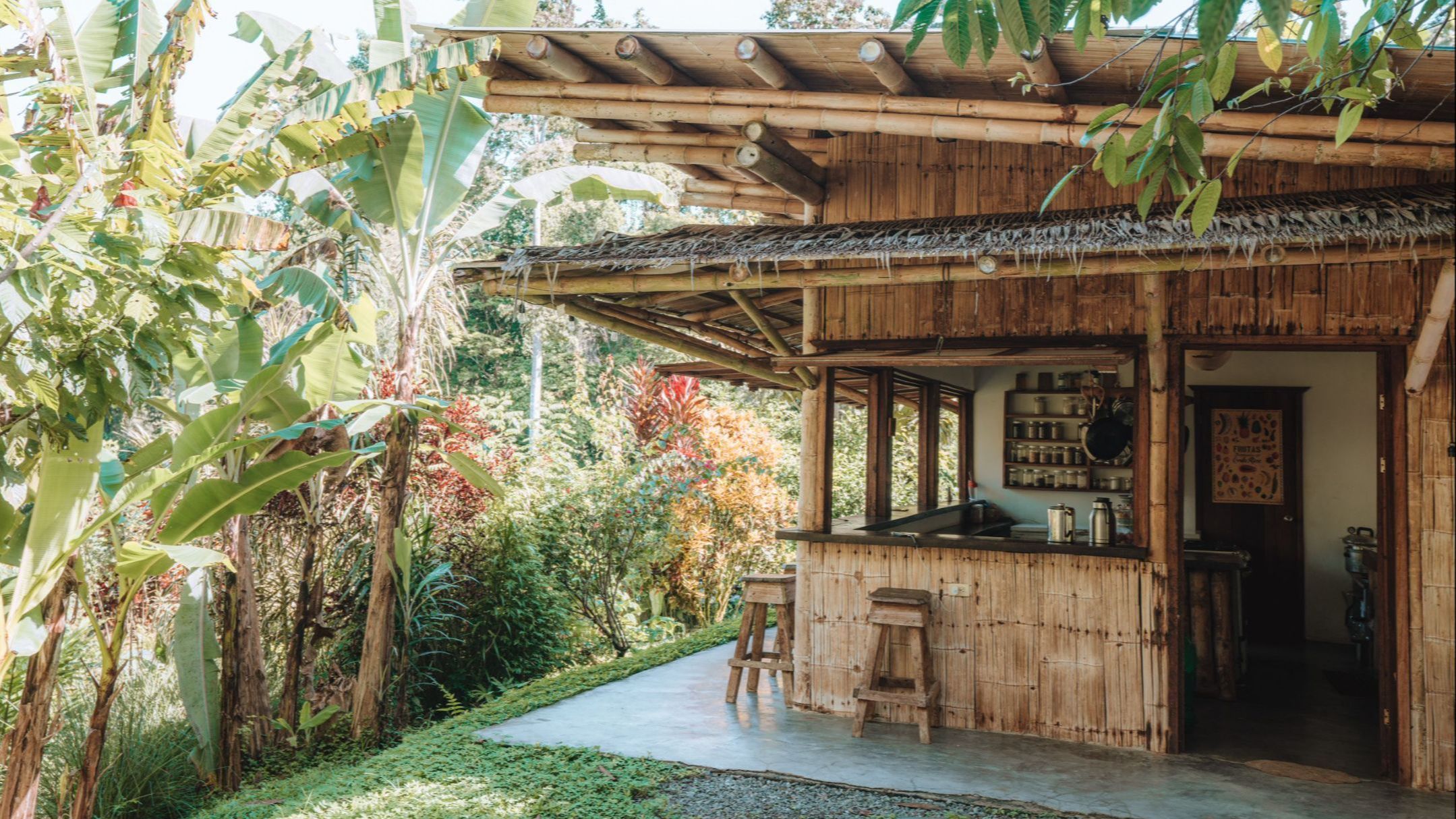
Homestead Infrastructure — Energy, Water & Waste Systems
Go beyond home design and explore the essential infrastructure that powers a self-sufficient tropical homestead.
You’ll learn how to:
-
Set up domestic solar power and solar hot water systems
-
Cook with fire using efficient and sustainable methods
-
Design effective rainwater harvesting systems
-
Recycle kitchen waste and capture nutrients from wastewater
-
Use key food processing tools like solar dehydrators, oil presses, grain mills, and pressure cookers
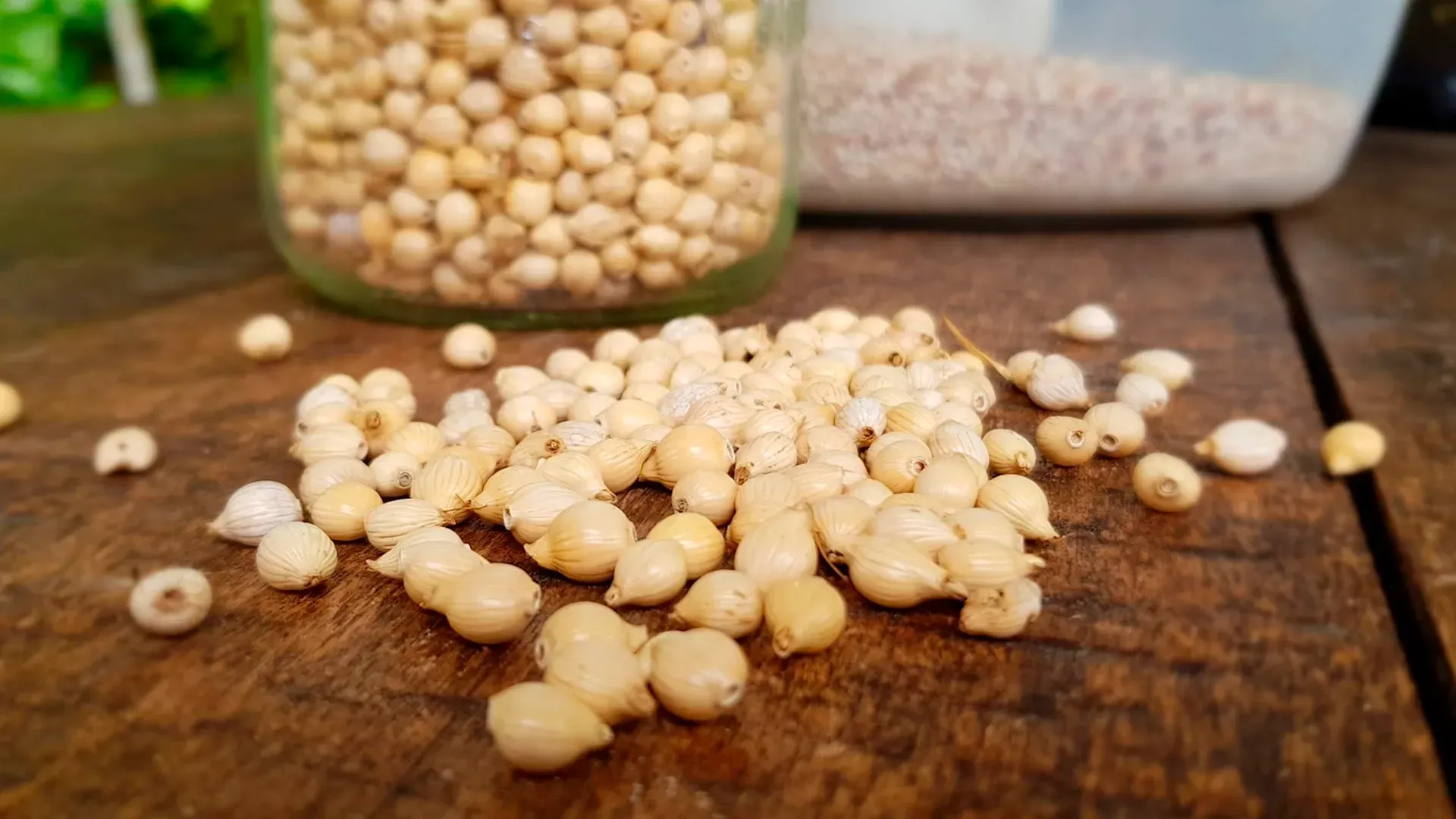
Crop Profiles — Master 60+ Essential Tropical Crops
Learn how to grow, harvest, and use the most important tropical foods with confidence.
For each crop, you’ll learn:
-
Why it’s a staple in a self-sufficient tropical diet
-
The best varieties to grow for resilience and yield
-
How to plant, propagate, fertilize, prune, and manage pests naturally
-
When and how to harvest, plus storage and processing tips
-
How to use it in your kitchen with our favorite recipes
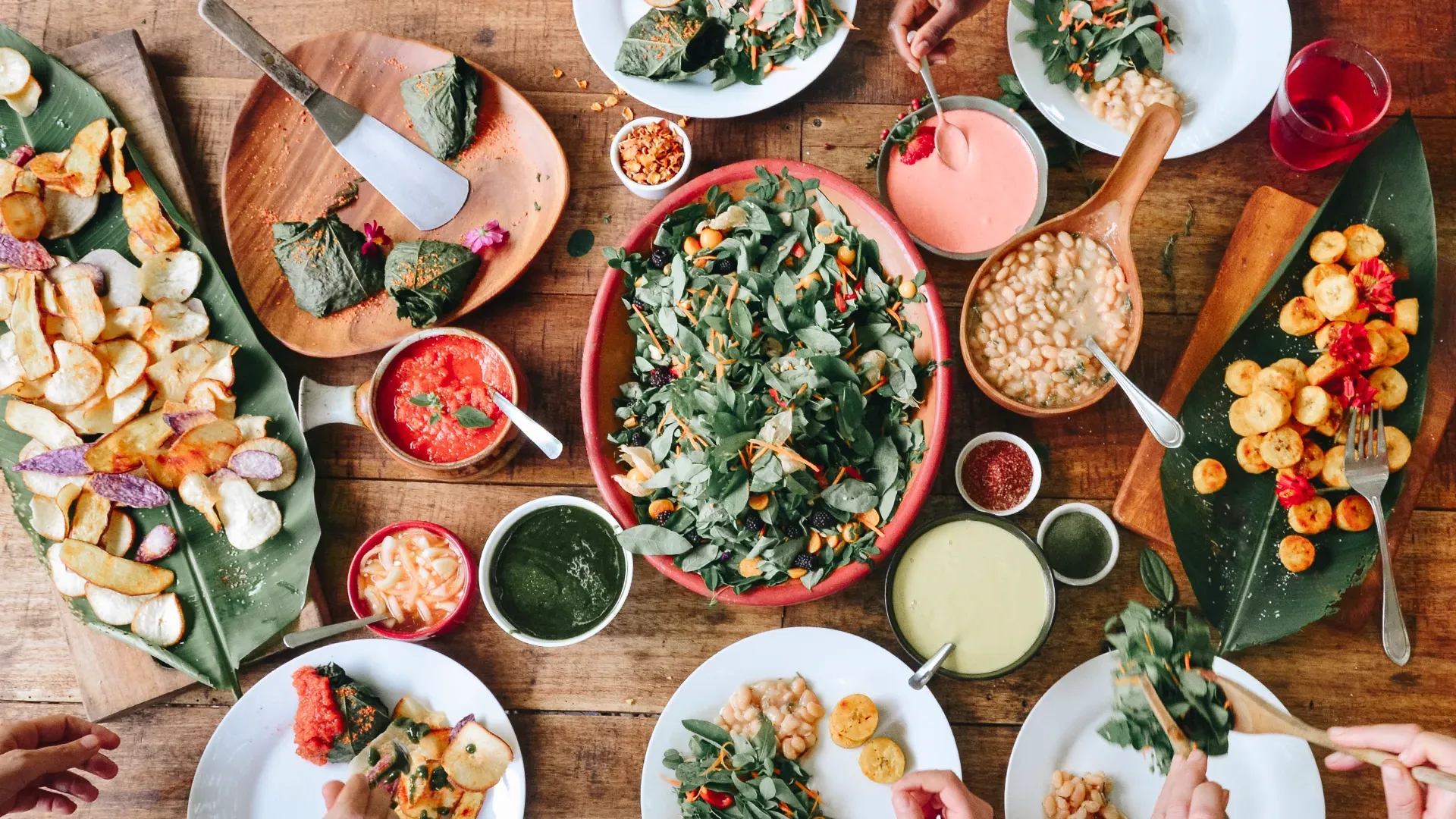
Wellness Kitchen — Cooking, Preserving & Nutrition
Turn your harvests into everyday meals, pantry staples, and natural medicines.
You’ll learn to:
-
Cook with fresh, whole ingredients from your garden
-
Preserve harvests into flours, oils, vinegars, sauces, teas, and spices
-
Keep a pantry stocked with year-round homegrown staples
-
Plan balanced meals using the Nutrition Chart and Sample Week Menu
-
Enjoy farm-to-table recipes tested in our tropical kitchen
- Understand the nutritional and medicinal power of your food
Meet Your Instructors
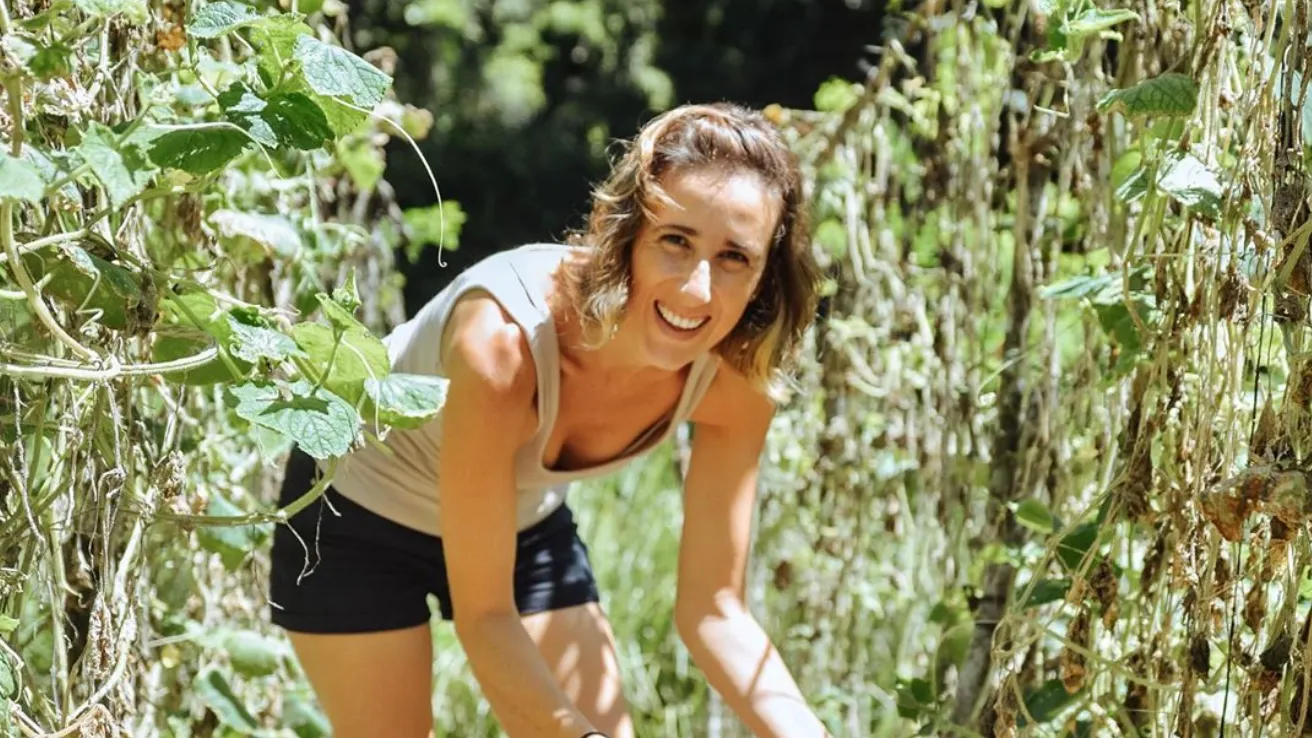
Ana Gaspar A.
Ana is a Costa Rican human rights lawyer specializing in Indigenous rights, environmental advocate, and co-founder of Finca Tierra. Founder of the BioRegional Plan for Talamanca, she works to integrate sustainability and food sovereignty into law, politics, and education—empowering local cultures and transforming systems to serve people and the planet.
At Finca Tierra, Ana leads the Wellness Kitchen, turning tropical harvests into nourishing, farm-to-table recipes.
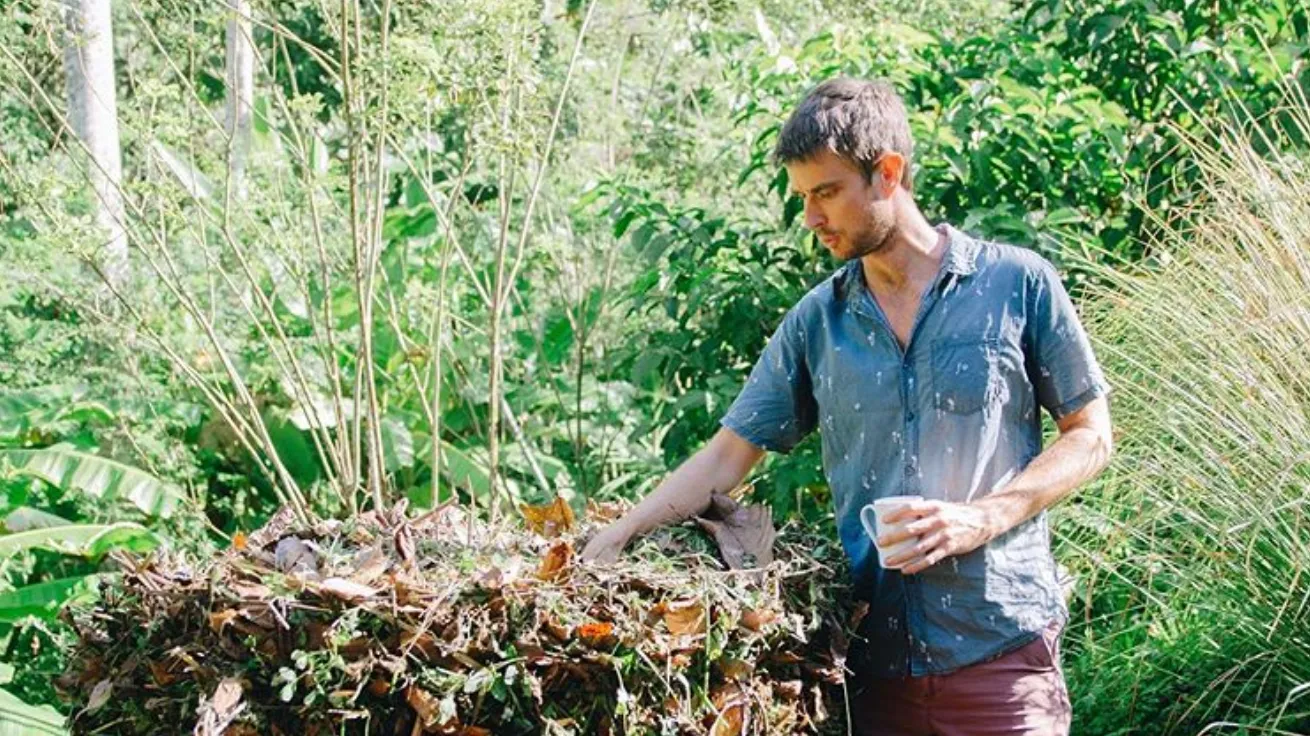
Ian Macaulay
Ian Macaulay is a tropical permaculture teacher and designer dedicated to helping others live from the land. After fifteen years of hands-on experience growing food and building off-grid systems at Finca Tierra in Costa Rica, he now shares the design principles that make self-sufficiency realistic and rewarding for anyone, anywhere in the tropics.
Turn Your Land into a Living System- Fast Track Productivity
Join the Tropical Permaculture Online Course to build your food forest, regenerative systems, and grow food, resilience, and abundance in the tropics.
Our Journey to Self-Sufficiency
In 2008, we began our journey into permaculture, initially inspired by the idea of building an energy-efficient home and growing our food. We wanted to eliminate rent, electricity, and water bills and produce a food forest to replace our grocery expenses. Ultimately, we envisioned creating something beautiful, low-maintenance, and cost-effective that would give us the freedom to share time with our loved ones and enjoy life—a system that would transform us from consumers to producers to heal our lives while helping to regenerate the planet.
Eventually, we founded the Finca Tierra Permaculture Education Center, where we still teach our immersive, hands-on two-week Permaculture Design Certificate Course (PDC). More than 1,000 students from around the world have since joined us to gain real-world experience in sustainability. Along the way, we’ve also launched and supported community projects that help others reconnect with land, health, and self-reliance.
For 15 years, we’ve dedicated our lives to experimenting, documenting, and refining this system, always focused on sustainability and economics. We aimed to be as self-sufficient as possible, minimizing off-site inputs and maximizing the dollar-per-hour value of our work.
After many years of living off-grid, we achieved a super efficient, productive ecosystem with a green homestead, food forest, and gardens that produce a complete diet. And we want to share it with everyone interested in becoming self-sufficient in the tropics!
In this course, we’ve documented everything you need to make it easy to replicate. It’s the transformative step-by-step guide we wish we had when we started!
If you live in the tropics and want to build resilience, reduce your grocery costs, or create an economically and environmentally sustainable lifestyle, this course is for you. Whether you're seeking to create a garden that produces literal tons of food in a few hours a week, hoping to build resilience against economic issues or job loss, or enjoy the satisfaction of gardening and connecting with nature, this course offers a blueprint for success.
Transform your relationship with nature and the land—join us and fast-track your journey toward a more efficient, resilient, and sustainable life!
Want to Stay Connected?
Join our community list for course updates and discounts from Finca Tierra.






